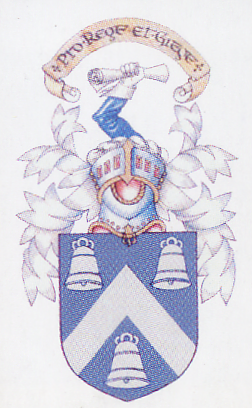The Madras College Magazine for
June 1908 reports on pages48-49:Dr.
W. O. Lonie
What old boy's heart does not warm at the mention of "Bim?".
Dr W W Tulloch is at a loss to
explain the origin of the soubriquet, used never in derision but always
with the warmest sympathy and admiration. To me its origin has always
been plain. it is simply the emphatic
expletive with which the Doctor prefaced every command or declaration, "B'm
- mount the form."
Dr Lonie was a native of Kinghorn. Another distinguished
Fifer - Thomas Barclay, Sheriff Clerk of the county, grandfather of Sir
Thomas Barclay - the eminent international lawyer of Paris and Vice
President of the Franco-Scottish Society, belonged to the same town and
interested himself in young Lonie's career. They were life-long friends.
After his College career at St Andrews, and taking his M.A. degree,
Mr Lonie obtained a post
as teacher in an English School. Here his youthful appearance gave the
boys the idea that this
was a teacher with whom they might take liberties and whose injunctions
they could safely set
at naught. But they were soon undeceived. The youthful teacher had more
force of character
and a stronger will than they. The reign of misrule they tried to
inaugurate was soon brought to
an end.
When the Rev William Martin was promoted from the Mathematical
Mastership of the Madras
College to the Chair of Moral Philosophy at Aberdeen, Mr Lonie was
appointed to fill the
vacancy. I remember sitting one day in the Latin class, when Provost
Playfair entered in
company with a young man whom he introduced to Dr Woodford, and the
whisper circled
round the class that this was the new Mathematical Master.
It was not long before he made his mark. His methods were not
stereotyped or formal. He did
not insist on the dry and rigid demonstrations of Euclid. He dealt with
mathematics not as an
exercise of memory but as an effort of intelligence and reason. His idea
of education was not to
plant seeds, but to develop the inherent powers and capabilities of the
soil, so that the seeds
when planted might grow and fructify to the utmost. His lessons were
always interesting. His
policy was to arouse an interest in the mind of his pupil, to show him
that the master was
interested in him and in this way to awaken in the pupil an interest in
the master. To effect this
purpose anything was employed. Did the pupil manifest a faculty in any
direction, it was at
once seized and utilised. Was it a liking for pictures and some faculty
in drawing, or for reading
in any particular line, or a love of flowers or other natural objects,
it was drawn out and formed
a link of attachment between master and pupil.
In this way the affection of the pupil was evoked and a foundation laid,
for the devotion which
characterises all who came under the Doctor's influence. Sometimes a
casual reference in the
class would set him off, and the hour was spent in a prelection which
had little reference to
mathematics. These occasions are remembered as the happiest and not
least useful and
stimulating incidents of the session.
" .... .... .... .... .... A willing ear
We lent him. Who but hung to hear
The rapt oration flowing free?"
With his mathematical ability Dr Lonie combined a love of literature
and a fine appreciation of
its beauties. He was fond of Tennyson and in his class of physical
geography it was not
unusual, amid the dry details of geographical phenomena, to hear from
his lips -
"The moanings of the homeless sea,
the sound of streams that swift or slow,
Draw down Aeonian hills, and sow
The dust of continents to be."
or
"There rolls the deep where grew the tree,
O earth what changes hast thou seen,
There where the long street rolls hath been
The stillness of the central sea.
The hills are shadows, and they flew
From form to form, and nothing stands;
They melt like mist the solid lands,
Like clouds they shape themselves and go."
The weakness of Dr Lonie - who among us has not his faults and
failings? - lay in his excessive
sensitiveness. This led him to imagine slights and insults where none
were conceived or
intended. The failing made him sometimes difficult to get on with. It
rendered the trials he met
with in his life specially sore and oppressive. The loss of his wife was
a great affliction; and the
death of his only son, a young man of remarkable promise, who was cut
off just when a
brilliant career seemed assured to him, was a heavy blow. But the
crowning calamity was his
removal from the post he had long held, a consequence of the
reorganisation of the institution.
He never got over it. It broke his heart. To his sensitive nature it
bore the aspect of disgrace. he
looked on it as dismissal because he was considered no longer worthy to
hold a position he was
conscious of having filled with credit to himself and usefulness to the
College and its alumni.
He retired to a cottage at Trinity and died within a short time after.
Peace be to his ashes. he lives still in the memory and lives of his
fondly attached and grateful
pupils.
Thos. Brown
|

